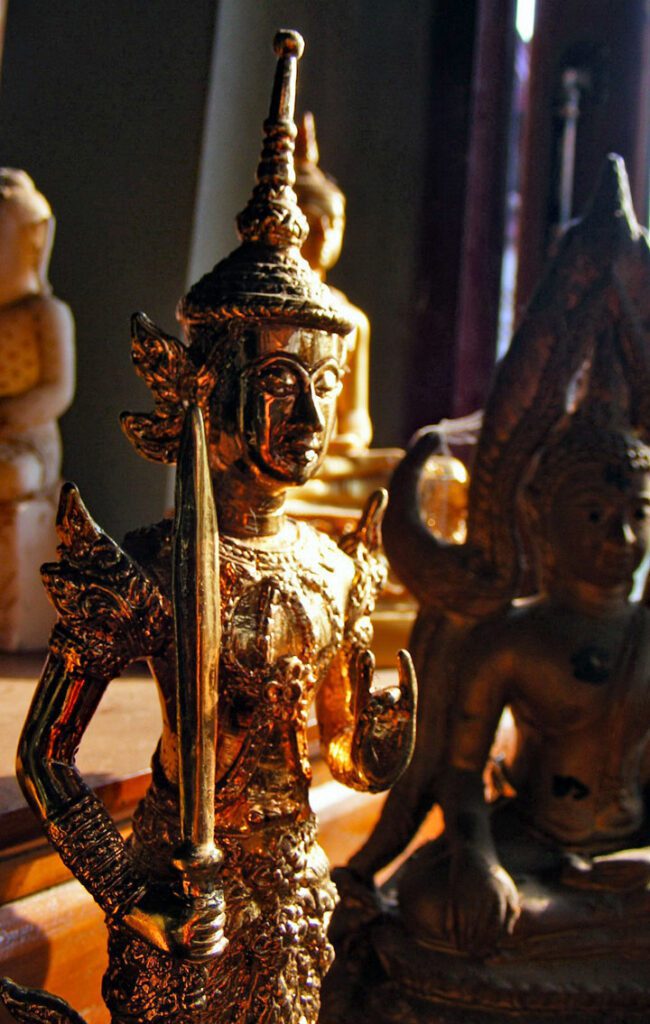All About Buddhism: Phra Siam Devadhiraj The Divine Guardian Angel Of The People Of Siam

By: อมูลเสรีวิกิมีเดียคอมมอนส์ – เทวประภาส มากคล ้าย – Own work, CC BY 3.0, https://commons.wikimedia.org/w/index.php?curid= 9935539
Bangkok Post recently published an interview with a well-known celebrity, Mr. Surachate Hakparn (alias Big Joke), about the injustice he suffered when his car was full of bullets. When asked about his situation, he said he was confident that the facts of his case would emerge, stating, “Thailand is protected by the tutelary deity Phra Siam Devadhiraj. Corrupt people will eventually suffer the consequences of what they did.”
The story did not go on to explain who this deity is, so many Western readers were left confused by the reference. It doesn't help that an internet search yields only the most spartan information about this deity. So for this issue of All About Buddhism I thought it would be helpful if we explored this deva's past.
Phra Siam Devadhiraj – in Thai พระสยามเทวาธิราช (Phrá Sàjǎam Thewa-thi râat) – is better known by its English name. This deity is what may be called a "guardian deity," or in other words, a spirit that defends a particular place. Many ancient Western cultures, such as Greece and Rome, also had their own spiritual protectors.
Technically speaking, English-language texts often label Phra Siam Devadhiraj as a Hindu-Buddhist deity. Yet this deity only officially emerged after the Bowring Treaty of 1855 was signed in Siam. This was a time when much of Southeast Asia was at risk of colonization.
Burma and the Malay states became British colonies in 1886 and 1786 respectively. Cambodia became part of a French protectorate in 1887 and Siam traded Laos to the French after losing an engagement with French gunboats in 1893.
Thai history is unique in that not only has it repeatedly recovered from a number of previous invasions, but Thailand is the only Southeast Asian country to avoid continued colonization by Western powers. So the prospect of a guardian angel is easy to imagine. A golden statue of Phra Siam Devadhiraj was cast during the reign of King Mongkut (1851-1868). This beautiful statue was originally located in the royal chapel of the Grand Palace, but was later moved to the throne room of Phaisarn Thaksin.
The figurine itself is quite beautiful. Cast in pure gold, it was originally mounted on a sandalwood plinth that was carved using traditional Thai artisan woodcarving. The plinth proudly bears an image of a great Naga (heavenly dragon), as well as a Thai phoenix.
The statue also bears the images of four supreme deities known as Vishnu, Uma, Narayana and Srasvati, all of which originate from the Hindu traditions. That said, I can only imagine that some readers would quite understandably wonder if this is actually a Hindu shrine.
However, my answer would be that it really is a uniquely Thai Buddhist shrine, not only because Phra Siam Devadhiraj has risen to become Thailand's guardian angel, but also because some concepts in Buddhism actually originated in Hinduism for the first time, such as karma and the water rituals of Sǒng Crane.
In addition, Siamese culture believed in a supreme guardian angel for countless centuries. King Mongkut, however, composed a Pali chant, giving a newfound power and angelic name to an ancient tradition that came from ancient times. A gala is still held at the statue of Phra Siam Devadhiraj during the traditional Thai New Year in April.
Regardless of the etymology, the role of Phra Siam Devadhiraj as a great protective spirit remains. References to Phra Siam Devadhiraj still appear, from time to time, in the modern Thai news and it is not uncommon for Thais to call on this protective deity/angel in times of desperation.
Thailand is indeed a mysterious country, but the unusual ways Thai people approach modernity really start to make perfect sense when we curious Westerners manage to unravel Siam's transcendental past. It's a big challenge, but one with big rewards.
All About Buddhism is a monthly column in The Phuket News where I took readers on my exotic journey into Thai Buddhism and debunked some myths about Buddhism. Let us know if you have specific questions or ideas for articles. E-mail [email protected], and we will do our best to accommodate your interests.
By The Phuket News By David Jacklin – Translation and editing Ronald Schütte

